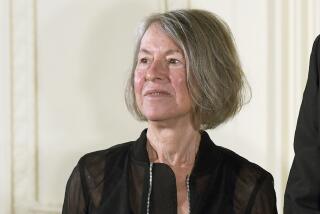Happy birthday, Sylvia Plath
- Share via
Poet Sylvia Plath was born on this day in 1932. Had she not committed suicide in 1963, she would have been 80 years old today.
Although she was just 30 years old when she died, Plath’s poetry has had lasting appeal. The Poetry Foundation writes that she has “tightly-tuned, startling verses.” Much of those were written toward the end of her life and published in her collection “Ariel.” Posthumously published with some assitance from her husband, the poet Ted Hughes, “Ariel” caused a splash with both its creativity and the questions it raised about the way Hughes, from whom she had separated, had shaped her work.
In Slate, Meghan O’Rourke details Plath’s progress on the collection. “She stopped working on it in mid-November of 1962, we think. And at 4 a.m. in the last few weeks of her life, she wrote some of the best poems of her career, the poems that, as she herself predicted in the febrile flush of composition, would ‘make my name.’ What Hughes did was to take these poems, some of which had a bleak, astonishingly pitched quietude—like Emily Dickinson’s ‘formal feeling’ that follows grief—and add about a dozen of them, including ‘Totem,’ ‘The Munich Mannequins,’ and the exquisite ‘Edge,’ to the end of her manuscript.” In 2004, Plath’s restored edition of the manuscript was published; O’Rourke found the Hughes version, which included the very late poems that Plath’s version did not, more powerful.
Plath’s posthumously published roman-a-clef, “The Bell Jar,” has also found generations of fans. Originally published psuedonymously in England, it was years before it found its way to American audiences -- and when it did, in 1971, it bore Plath’s name.
On the 40th anniversary of the publication of “The Bell Jar,” Emily Gould wrote about the novel’s delayed path to U.S. publication for the Poetry Foundation. “In March 1970, the poet Ted Hughes found himself in a tricky real estate situation. There was a charming seaside house he wanted to buy, in Devonshire, but the necessary funds weren’t at hand. Of course he could have sold one of his two other homes, but one was the home he had shared with his now deceased ex-wife Sylvia Plath, another was a solid investment, and so on. In the end, he wrote to Sylvia Plath’s mother, Aurelia, asking for her blessing to sell one of his other assets: her daughter’s first and only novel, written a year before her suicide in 1963, for which Hughes suspected there might now be a market in the United States.” It has never gone out of print.
The Poetry Foundation has two dozen of Plath’s poems on its website, including an audio recording of the writer herself reading “Fever 103º.”
Forty-nine years after her death, Plath remains a cultural touchstone. Patti Smith dedicates songs to her. She shows up as a character in movies and plays. She features in other people’s novels, in multiple biographies, in examinations and rexaminations of her work. And despite her early death, she has found a writerly immortality: she continues to be read.
ALSO:
2012 Whiting Award winners announced
Edward Gorey’s gothic tales from the vault
Gabriel Garcia Marquez celebrated in Mexico City, his adopted hometown
Carolyn Kellogg: Join me on Twitter, Facebook and Google+
More to Read
Sign up for our Book Club newsletter
Get the latest news, events and more from the Los Angeles Times Book Club, and help us get L.A. reading and talking.
You may occasionally receive promotional content from the Los Angeles Times.











